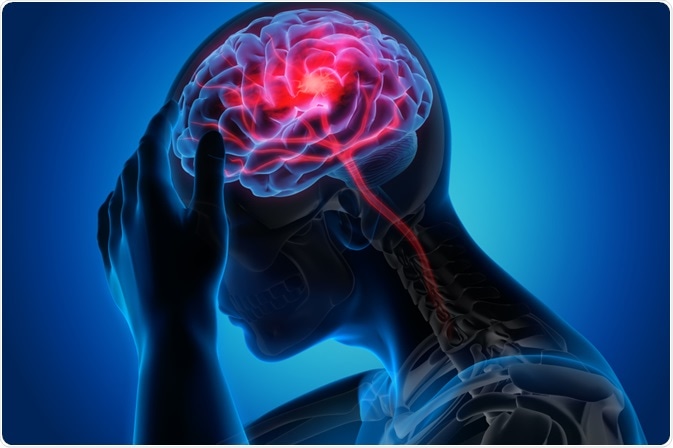One of the most common persistent symptoms of post-traumatic brain injury (TBI) is that of frequent headaches, also known as post-traumatic headache (PTH). These headaches can impair normal daily function and can make concentration or remembering things difficult.
 Image Credit: peterschreiber.media / Shutterstock.com
Image Credit: peterschreiber.media / Shutterstock.com
Headaches after TBI
PTHs develop within a week of trauma, and most cases of PTH tend to resolve within a year after injury. However, around 30% of PTH cases persist beyond a year. The most common types of PTH are those that are clinically similar to tension-headaches (around 37%) and migraines (around 29%).
The frequency of headaches is exacerbated by TBI. Approximately 84% of patients have headaches four or more days per week. PTH leads to greater disability, with reductions in activities of daily living on three days per week on average.
Some cases can even lead to complete disability for up to 2 days of the week. These averages are significantly higher compared to headache patients without TBI. In one sample studied, the frequency of headaches after TBI was higher in females compared to males, possibly due to hormonal differences or other sex differences.
The causes of PTH after TBI may differ, depending on the kind of TBI occurring, or complications as a result, or even due to treatment strategies employed. Surgery performed on the skull may be a cause of recurrent headache or the accumulation of blood of fluid inside the skull can cause increased pressure. However, the severity of TBI does not necessarily dictate the incidence or severity of PTH, and even milder TBIs can lead to PTH.
Treatment of Headaches after TBI
Although PTHs are secondary headaches, they are often treated as primary headaches. Each individual case is different, and treatment needs to be tailored to the specific case by doctors’ advice. Keeping track of headaches and response to different treatments is also important to make use of the most effective treatment, or to avoid treatments that could exacerbate the symptoms.
Several lifestyle factors can be modified to prevent the triggering of headaches. Some of these may work for certain TBI patients, but others will not. Simple lifestyle modifications can include getting enough sleep, brief or moderate exercising such as walking or stretching, and avoiding caffeine and alcohol.
Specific treatments for moderate or less frequent headaches (occurring less than 2-3 times a week) can include over-the-counter medications such as ibuprofen or paracetamol, specific prescription medications, relaxation therapy/meditation, biofeedback therapy, massages, acupuncture and the use of heat/ice packs.
Treatment of more frequently occurring and moderate-severe intensity headaches may require additional approaches such as local steroid injections, Botox injections, beta-blockers, anticonvulsants such as gabapentin and in some cases the use of antidepressants that are also commonly used in patients with fibromyalgia or rheumatoid arthritis.
Sources:
- Hoffman et al, 2011. Natural History of Headache after Traumatic Brain Injury. J Neurotrauma. 2011 Sep; 28(9): 1719–1725. https://www.ncbi.nlm.nih.gov/pubmed/21732765
- Lew et al, 2006. Characteristics and treatment of headache after traumatic brain injury: a focused review. Am J Phys Med Rehabil. 2006 Jul;85(7):619-27. https://www.ncbi.nlm.nih.gov/pubmed/16788394
- Marcus, 2003. Disability and chronic post-traumatic headache. Headache. 2003 Feb;43(2):117-21. https://www.ncbi.nlm.nih.gov/pubmed/12558765
Further Reading
Last Updated: Nov 21, 2019